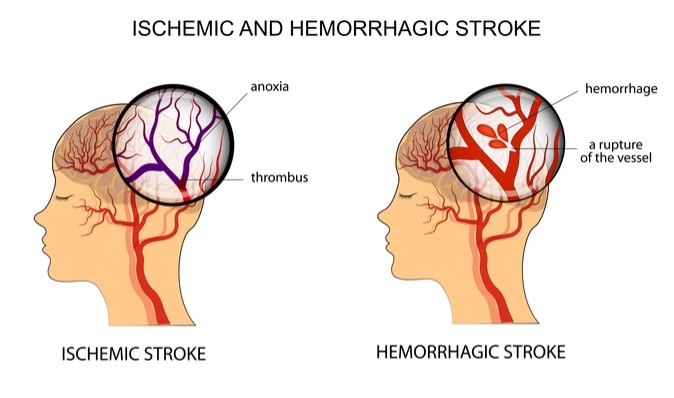In patients who have had a minor stroke or a transient ischemic stroke (TIA), the risk of getting a full-blown stroke or a major stroke is high.
A new study has found that these high-risk individuals, when prescribed with clot-preventing drugs clopidogrel along with aspirin show a lower risk of getting major stroke.
This study was part of the Platelet-Oriented Inhibition in New TIA and minor ischemic stroke (POINT) trial. This was a large randomized, double-blind, placebo-controlled trial that was undertaken between May 2010 and December 2017. The study was published in the latest issue of the journal The New England Journal of Medicine. The results of the study were presented at the 4th European Stroke Organization Conference in Gothenburg, Sweden.

Illustration of the vessels of the brain and a brief description of the causes of stroke. Image Credit: Artemida-psy / Shutterstock
The study involved 4,881 adults from 269 trial sites in 10 different countries in North America, Europe and Australia, who had had a minor stroke or a TIA. These people were all administered clopidogrel plus aspirin. They showed a 25 percent lower risk of major strokes, heart attacks and deaths from blood clots over the next 90 days from the first incident when compared to patients who were given aspirin alone.
Lead author Clay Johnston, dean and professor of neurology at Dell Medical School at The University of Texas at Austin said that this study is “solid evidence” that this drug combination can help stop stroke in persons who are at greatest risk. He added however that this combination is not free from risk of bleeding.
According to research, persons who have had a minor stroke or a TIA are at a 3 to 15 percent risk of getting a major stroke within the first three months.
TIA or a minor stroke is often thus a warning for a major stroke. It occurs due to temporary block of the blood vessels in the brain. The block may dissolve by itself making the symptoms short lived.
According to the American Stroke Association over a third of the American adult population has had symptoms of TIA at some point in their lives.
In an additional finding, the researchers noted that the combination of clopidogrel and aspirin led to an increased risk of bleeding compared to aspirin alone. They noted that for every 1000 people who were given the combination drug there were five more episodes of major bleeds expected compared to those given aspirin alone but there were also 15 fewer cases of major strokes and heart attacks.
Johnston said bleeding episodes are manageable but the benefits of the combination outweigh the risks of bleeding. Co-author Donald Easton professor of neurology at the University of California, San Francisco School of Medicine said that there were 33 cases of major bleeds in these 4,881 patients and of these over half were in the gastrointestinal tract. None of the patients succumbed to the bleedings he said. The bleeding episodes were “preventable and treatable” and their risk was well balanced by prevention of “debilitating” strokes, he explained.
Johnston said that it is likely that in future more people who have had a minor stroke or a TIA would be prescribed a combination of clopidogrel and aspirin to prevent major strokes.
The POINT trial was funded and supported by National Institute of Neurological Disorders and Stroke (NINDS), part of the National Institutes of Health.